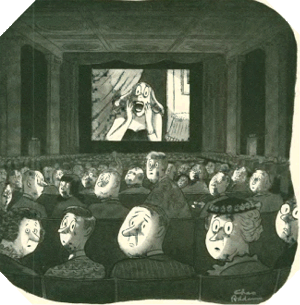
''Alas, poor Yorick! ... Here hung those lips that I have kissed I know not how oft. Where be your gibes now? your gambols? your songs? Your flashes of merriment, that were wont to set the table on a roar? Not one now, to mock your own grinning?''
Pictured above in the gravedigger scene in the Shakespearean play "Hamlet" is the actor (err ... actress) Sarah Bernhardt at 56, one of the few women to play the role, and arguably the most famous actress of the 19th century. Her Hamlet tour opened in 1899 in Paris, and continued for two years showing in London, Scotland, Switzerland, Austria and Hungary. The tour attracted considerable attention in the literary press at the time. An interesting piece of contemporary published criticism has “Madame Bernhardt’s assumption of masculinity ... so cleverly carried out that one loses sight of Hamlet in one’s admiration of the tour de force of the actress”.
The gloves are off though as the same critic blasts the very scene pictured above:
“This skull, too, which had “lain in the earth three and twenty years,” instead of being brown, discolored, was of a staring and indecent whiteness, as of bone boiled and bleached. It was not pleasant to see the grinning object handled so callously. Some of the dramatic effect, too, went by the board in this; for what’s the use of bringing in the ironic emblem of mortality if it is treated as lightly as a lap-dog? Indeed, I feel sure that Madame Bernhardt treats her lap-dog more considerately, for it would be strange if she made gestures with it as unconcernedly as she does with the skull. If my eyes did not deceive me, she tapped the grinning teeth with her finger; and she certainly is far from objecting as genuinely to the odor of mortality as Shakespeare makes Hamlet when he asks if Alexander “looked o’ the fashion i’ earth, and smell so? Pah!” Here the actor is expressly directed to “put down the skull”, but Madame Bernhardt could not only endure to hold it without “Pah!” she seemed to forget what it was she had in those eloquent hands of hers, as she emphasized feelingly the lines on imperious Caesar by gesticulating with a skull of a former acquaintance.”
Bernhardt began touring internationally in 1880, travelling in special luxury railway cars and appearing for big money in cities across Europe and the United States. Reportedly not the most beautiful or even the most talented, she knew how to cultivate her stardom. She worked like a pack horse, her French patriotism made her a national emblem; her wit, temper tantrums and willingness to try new things ensured that her worldwide super stardom would last from her first hit in 1869 through to her death in 1923.

Sarah was as famous a personality as she was an actress. She painted, sculpted and wrote; she engaged in violent feuds and equally violent love affairs. Oscar Wilde apparently held her in awe, “throwing lilies at her feet” when she arrived in England, but curiously in a sonnet represents her as a “vampire from hell”, the recipient of kisses from “the loveless lips” of dead men. She obligingly slept in a coffin for photographers, though she used a normal bed for more private slumber. Her romantic conquests were legend involving royalty [presumably Edward VII of England for example], and countless famous artists and actors of both sexes. She is famously quoted as saying "We ought to hate very rarely, as it is too fatiguing, remain indifferent a great deal, forgive often, and never forget."







